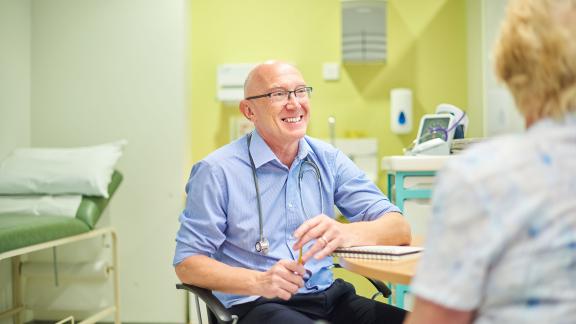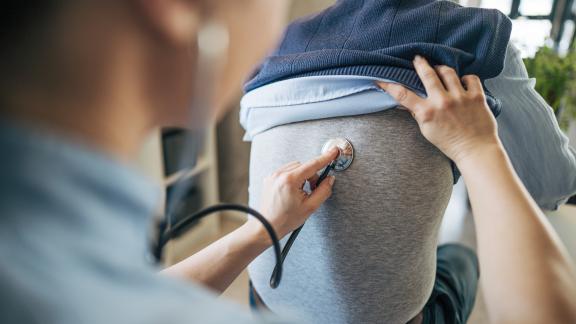Reducing waiting lists by repurposing a Nightingale hospital into a protected elective centre

Waiting lists for some procedures in Devon have been cut by converting a Nightingale hospital into a protected elective centre delivering additional orthopaedic, ophthalmology and diagnostic activity. Cooperation between clinicians from different trusts has resulted in innovative ways of working. The Devon integrated care system has worked with local trusts – principally the Royal Devon University Health Foundation Trust but also Torbay and South Devon Foundation Trust and University Hospitals Plymouth Trust – to deliver the extra capacity.
Key benefits and outcomes
- Patients who would have faced a long wait from across Devon are being seen more quickly in a facility that is not at risk of cancellation from emergency pressures.
- Shorter stays for orthopaedic patients receiving hip and knee replacements, many of whom can be discharged on the same day as their operation.
- The centre has been a catalyst to encourage a ‘system first’ mindset.
What the organisation faced
One Devon ICS wanted to reduce waiting lists for procedures such as orthopaedics, ophthalmology and diagnostic activity, which were at an all-time high. The ICS wanted to work with the local trusts to deliver extra capacity, but communication and cooperation across them was patchy.
Exeter’s Nightingale hospital was the last established during the first wave of the COVID-19 pandemic, meaning that learning from successful treatment regimes could be incorporated into the building design. This resulted in a smaller hospital being built, with proportionately fewer intensive therapy unit beds and more general respiratory beds. An empty retail unit was leased, with an option to buy, and eventually housed about 200 COVID-19 patients. But there was a determination from the clinical commissioning group and the Royal Devon University Health Foundation Trust (RDUH) to use it to address longer-term issues the region’s health services would face in recovering from the pandemic – especially long waiting lists in orthopaedics and ophthalmology.
What the organisation did
One Devon ICS supported the RDUH with the business case to acquire the Nightingale hospital by underwriting the standby costs of the building. A bid to be an accelerator site for elective recovery ensured funding to support longer-term use of the site. Importantly, the case was made for capital, rather than revenue funding, to ensure a legacy. This funding was used to modify space in the Nightingale hospital into orthopaedic wards, with recovery areas and modular theatres bolted onto the outside of the building.
Two clinical leaders – one from RDUH and one from the Torbay and South Devon Foundation Trust – were tasked with developing a new model of care for patients, with high-level executive support. They visited other centres in England and decided that many hip and knee replacement patients should be treated as day cases or, at most, with an overnight stay. The unit started taking patients in March 2022, initially operating three days a week but later extending this to six-day working. As a ‘system asset’, surgeons from other trusts also operate at the centre.
Other space in the Nightingale has been converted to a 'one stop shop' for glaucoma patients, with an innovative high-volume operating model that channels patients through a new pathway, culminating in them seeing a consultant only if needed. Cataracts are now being treated via a ‘SurgiCube’, which operates a clean air system in a procedure room through an overhead canopy, rather than in an operating theatre – and reducing capital costs by 90 per cent.
Results and benefits
- Patients from across Devon have been treated quicker in a dedicated unit, with no risk of high demand for emergency care affecting their planned operation.
- The reduction in length of stay – achieved through a total redesign of the pathway and the use of evidence-based protocols at all stages of the patient journey – reduces costs and increases patient throughput.
- Learning from the site is now being spread through all Devon trusts. Of 854 patients treated, 99.7 per cent have gone home within one day, with 57 per cent leaving the same day.
- Outcomes and patient experience have been excellent.
Overcoming obstacles
A blend of new recruits and experienced staff has been built up, without weakening the staffing levels in the base units. To retain staff, it has also been necessary to expand the range of specialisms to provide diversity, including foot and ankle surgery.
The modular theatres have limited car parking but staff and patients have adapted to using a shuttle bus which operates between the hospital and a nearby park and ride.
Elective recovery funding – expected to be awarded on the basis of ICS performance rather than trusts – is important to the ongoing financing of the facility: this exposed RDUH, as the host trust, to financial risk if performance targets were not met. After discussions, it was agrees that this risk would be shared among the system as a whole.
Takeaway tips
- Use a different setting as a chance to bring together clinicians from partner organisations to share ideas and draw on wider good practice. Be clear this is a chance to be radical with senior leaders’ support.
- Buildings not originally designed for healthcare may not meet normal estates standards, for example around room size. This can encourage a resourcefulness about the art of the possible.
- Staff facilities are important – access to food and drink, rest areas and lockers.
- Auditing began as soon as the orthopaedic centre was up and running. This has been crucial in persuading other surgeons of the validity of its short-stay approach
- Celebrate as a system when receiving recognition.
Further information
For more information on the work in this case study, please contact Chris Tidman, Deputy CEO, RDUH – c.tidman@nhs.net – or Chris Crow, Programme Director, RDUH – c.crow@nhs.net.



